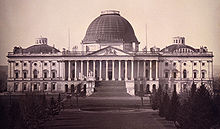Thirty-first Congress
| 31st United States Congress | |
|---|---|
|
30th ←
→ 32nd
|
|

United States Capitol (1846)
|
|
| March 4, 1849 – March 4, 1851 | |
| Senate President |
Millard Fillmore (W) until July 9, 1850 Vacant from July 9, 1850 |
| Senate Pres. pro tem |
David R. Atchison (D) William R. King (D) |
| House Speaker | Howell Cobb (CU) |
| Members | 62 Senators 233 Representatives 2 Non-voting members |
| Senate Majority | Democratic |
| House Majority | none: Democratic plurality |
| Sessions | |
|
Special: March 5, 1849 – March 23, 1849 1st: December 3, 1849 – September 30, 1850 2nd: December 2, 1850 – March 4, 1851 |
|
The Thirty-first United States Congress was a meeting of the legislative branch of the United States federal government, consisting of the United States Senate and the United States House of Representatives. It met in Washington, D.C. from March 4, 1849, to March 4, 1851, during the 16 months of the Zachary Taylor presidency and the first eight months of Millard Fillmore's. The apportionment of seats in this House of Representatives was based on the Sixth Census of the United States in 1840. The Senate had a Democratic majority, while there was a Democratic plurality in the House.
During this Congress, two Senate seats were added for the new state of California.
During this Congress, two House seats were added for the new state of California.
This list is arranged by chamber, then by state. Senators are listed by class, and Representatives by district.
Senators were elected by the state legislatures every two years, with one-third beginning new six-year terms with each Congress. Preceding the names in the list below are Senate class numbers, which indicate the cycle of their election. In this Congress, Class 1 meant their term ended with this Congress, facing re-election in 1850; Class 2 meant their term began in the last Congress, facing re-election in 1852; and Class 3 meant their term began in this Congress, facing re-election in 1854.
The names of members of the House of Representatives are preceded by their district numbers.
Both representatives were elected statewide on a general ticket.
The count below reflects changes from the beginning of the first session of this Congress.
Lists of committees and their party leaders.
...
Wikipedia
